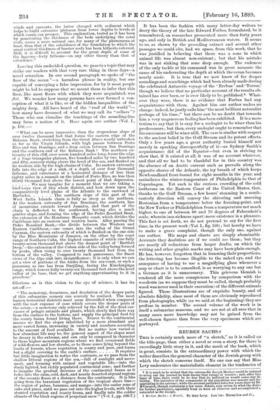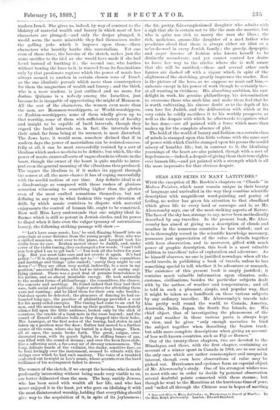REUBEN SACHS.t THIS is certainly much more of "a sketch,"
as it is called on the title-page, than either a novel or even a story, for there is exceedingly little story in it, and the merit of the book, which is great, consists in the extraordinary power with which the writer describes the general character of the Jewish group with which the sketch concerns itself. No one can say that Miss Levy underrates the materialistic element in the tendencies of
• It is much to be wished that the veteran Sir Joseph Hooker could be induced to bring out the journal he kept during that voyage of wonder ; and, after this lapse of time, there could be no fear that its publicat'on would cause any ill- feeling. The narrative of the commander of the expedition was meagre and dis- appointing in the extreme; while the accountpublished but a few years since by Dr. M'Cormick, though containing a few more details, only serves to whet the desire for further particulars, especially from so keen an observer and accomplished a naturalist as Sir Joseph.
t Reuben Sachs : e S'retch. By Amy Levy. Lon:on : Afacmilan and Cc.
modern Israel. She gives us, indeed, by way of contrast to the idolatry of material wealth and luxury in which most of her characters are plunged,—and only the deeper plunged, it would seem, the more miserable they find themselves under the galling yoke which it imposes upon them,—three characters who heartily loathe this materialism. Yet one even of these three, the heroine of the sketch, makes just the same sacrifice to the idol as she would have made if she had loved instead of loathing it ; the second one, who loathes without bowing the knee to it, is rescued from its fascinations only by that passionate rapture which the power of music has always seemed to awaken in certain chosen sons of Israel, as the one idealistic pursuit which more than counterpoises for them the magnetism of wealth and luxury ; and the third, who is a mere student, is just outlined and no more, for Joshua Quixano is a nobody among the Israelites, just because he is incapable of appreciating the might of Mammon. All the rest of the characters, the women even more than the men, are Mammon-worshippers, or World-worshippers, or Fashion-worshippers, some of them wholly given up to that worship, some of them with sufficient variety of faculty and insight to be capable of lucid intervals, though they regard the lucid intervals as, in fact, the intervals when their mind, far from being at its serenest, is most disturbed. The Jews have, it would seem, somehow divined that if in modern days the power of materialism can be resisted success- fully at all, it can be most successfully resisted by a sort of idealism which makes no claim to be definite, but which, like the power of music, causes all sorts of vague chords to vibrate in the heart, though the owner of the heart is quite unable to inter- pret even the general meaning of the vibrations thus produced. The vaguer the idealism is, if it makes its appeal through the senses at all, the more chance it has of coping successfully with the sordid realism of our time. Any definite ideal is at a disadvantage as compared with those rushes of glorious sensation witnessing to something higher than the glories even of the most exalted sensations themselves, but not defining in any way in what fashion this vague elevation of drift, by which music contrives to dispute with material enjoyments the control of human life, ought to be construed. How well Miss Levy understands that one mighty ideal in- fluence which is still so potent in Jewish circles, and its power to dispel when it lists even the vulgar tyranny of ostentatious luxury, the following striking passage will show :—
"' Let's have some music, Leo,' he said, flinging himself into an arm-chair at some distance from the young people. Rose, who was a skilled musician, went over to the piano, and Leopold took his violin from its case. Reuben moved closer to Judith, and, under cover of the violin tuning, they exchanged a few words. I can't tell you how glad I am to get back.'—' You look all the better for your trip. But you must take care and not overdo it again. It's bad policy.'—` It is almost impossible not to.'—` But those committees and meetings and things' (she smiled), surely they might be cut down 2'—` They are often very useful, indirectly, to a man in my position,' answered Reuben, who had no intention of saying any- thing cynical. There was a good deal of genuine benevolence in his nature, and an almost insatiable energy. He took naturally to the modern forms of philanthropy : the committees, the classes, the concerts and meetings. He found indeed that they had their uses, both social and political ; higher motives for attending them were not wanting ; and he liked them for their own sake besides. Out-door sports he detested; the pleasures of dancing he had ex- hausted long ago ; the practice of philanthropy provided a vent for his many-sided energies. The tuning had come to an end by now, and the musicians had taken up their position. Immediately silence fell upon the little audience, broken only by the click of counters, the crackle of a bank-note in the room beyond ; and the sound of Ernest's solitaire balls as they dropped into their holes. Mrs. Leuniger, at the first notes of the tuning, had stolen in and taken up a position near the door; Esther had moved to a further corner of the room, where she lay buried in a deep lounge. Then, all at once, the music broke forth. The great, vulgar, over- decorated room, with its garish lights, its stifling fumes of gas, was filled with the sound of dreams ; and over the keen faces stole, like a softening mist, a far-away air of dreamy sensuousness. The long, delicate hands of the violinist, the dusky, sensitive face, as he bent lovingly over the instrument, seemed to vibrate with the strings over which he had such mastery. The voice of a troubled soul cried out to-night in Leo's music, whose accents even the hard brilliance of his accompanist failed to drown."
The women of the sketch, if we except the heroine, who is made profoundly interesting without being made very visible to us, are better delineated than the men. The lazy, untidy Jewess, who has been sated with wealth all her life, and who has never enjoyed it in the least, yet who goes on idolising it with the moat disinterested worship, holding that everything should give way to the acquisition of it, in spite of its joylessness ;
the fat, pretty, fair-complexioned daughter who admits with a sigh that she is certain not to like the man she marries, but who is quite too rich to marry the man she likes ; the rich, malicious, gnome-like daughter of a mad father who proclaims aloud that there is always either an idiot or a ne'er-do-weel in every Jewish family ; the greedy, dyspeptic, and eager devotee of fashion who knows herself to be distinctly second-rate, and yet cannot control her desire to force her way to the circles where she is well aware that she will be snubbed,—these and several other such figures are dashed off with a vigour which, in spite of the slightness of the sketching, greatly impresses the reader. Nor is the picture of the hero, as we suppose we must call him,— unheroic except in his power of work though he certainly
at all wanting in vividness. His absorbing ambition, his vast delight in work, his genuine philanthropy, his determination to overcome those who snub him and make them feel that he is worth cultivating, his sincere doubt as to the depth of his own love for Judith, and the deliberation with which at its very crisis he coldly sacrifices it to his worldly prospects, as well as the despair with which he afterwards recognises what he has done,—are all painted with a force which more than makes up for the complete absence of plot.
The hold of the world of luxury and fashion on a certain class of minds is stamped upon this little volume with the same sort of power with which Crabbe stamped upon his poems the sordid misery of humbler life; but, in contrast to it, the idealising yearnings of the heart are also painted, though with a sort of hopelessness,—indeed, a despair of giving them their true rights over human life,—and yet painted with a strength which is all the more impressive for that obvious despair.







































 Previous page
Previous page